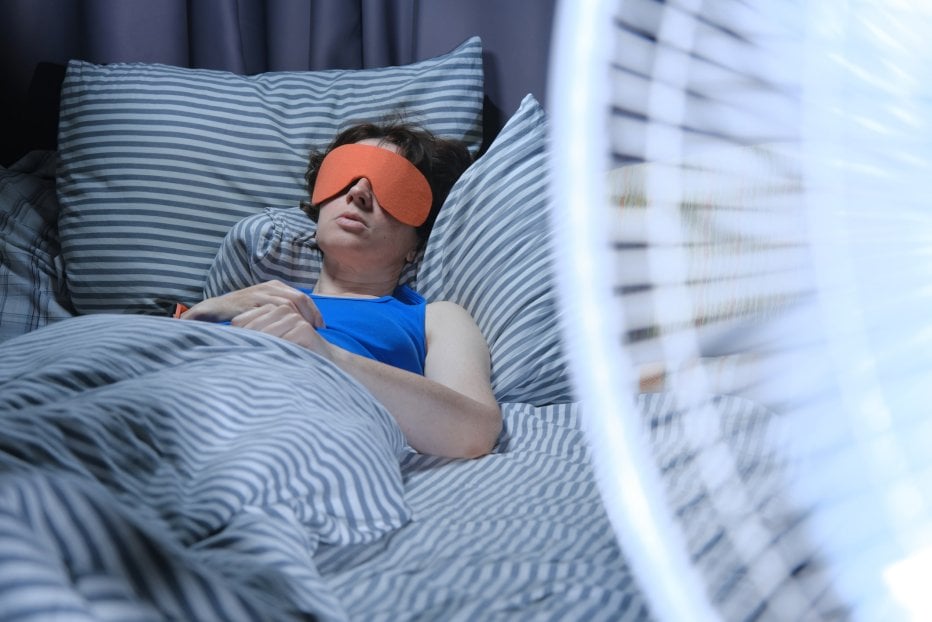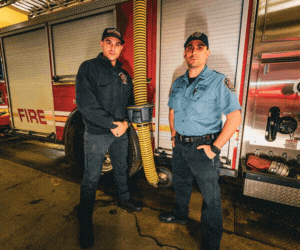Firefighter’s Guide To Maximizing Sleep

By: First in Wellness
Losing sleep is part of the job. Maximize what you can get.
Sleep is part of the job.
Sleep has been called the best performance enhancing drug. But, as a firefighter, you are not in complete control of your sleep schedule. You need ways that help you maximize the sleep you get even if you can’t always get those 7-9 hours that would be ideal.
The results of better sleep are amazing:
- More muscle mass
- Less body fat
- More energy
- Better sex drive (and performance)
- Better mental health and moods
Other great results are less sexy, but every bit as amazing:
- Reduced cardiovascular disease, cancer rates, and diabetes
- Weight loss
- Less frequent colds and flus
- Fewer mood disorders
- Fewer injuries
- Fewer motor vehicle accidents
Looking better, feeling better, and fewer things that will land you in the hospital!
Getting Better Sleep Is Easy
It’s easy as long as you’re consistent…but you already knew that.
Pick one or a few powerful suggestions from this eBook that you know you will do. Any effort you put toward better sleep will pay you back big time.
Of course, putting more into your sleep will get you better results. However, the items in this eBook list are so powerful, you’ll benefit from just making 1-2 into a habit.
Note about BIOLOGY
Humans are biology. As biological creatures, we have always been dependent on light, our environment and food. Notice how the suggestions in this ebook are basically helping you make your modern life more consistent with what it has been like for the human animal. For example, exposure to morning sunlight might seem insignificant, but the modern world is so different from what it used to be that these sorts of changes add up to make a big difference.
The Power of Light
1. Use sunlight to establish better sleep/wake patterns
- Within 1 hour of waking and within 2 hours after sunrise, go outside without sunglasses or glasses for 10-15 minutes (do not look directly at sun)
- Exposure to morning sunlight starts a timer in your brain that tells your body to get sleepy in the evening
- If you’re up all night, or get less than 6 hours of consecutive sleep, avoid early morning sunlight and try to take a 20-120 minute nap, awake by 3 pm (if you’re driving home after your shift you can wear amber glasses to drive home)
2. Avoid bright lights and blue light at night after 8 pm
- Turn down lights at night, or turn on only 1-2 lights with orange light bulbs
- If you must use your phone, tablet, computer, or watch TV – wear amber glasses or use the night setting on your phone, tablet, computer, or TV
- Bright lights at night signal your body to stay awake, making it harder to fall asleep and stay asleep
The Power of Food and Drinks
1. Avoid coffee/caffeine after noon
- Caffeine blocks a receptor that signals your body to feel sleepy (adenosine receptors)
2. Eat meals at regular times, avoid grazing
- Eating at regular times is another way to strengthen healthy sleep/wake cycles in your body. Are you seeing a pattern? Your body really likes routine!
- Last meal 3+ hours before bed
- Eating before bed, especially a large meal, will impair your sleep quality – your body is busy digesting and not focused on sleep and repair
- If you missed dinner, consider a small meal
- Example mini meals:
- Protein shake with berries
- Plain yogurt and berries
- 1-3 oz lean meat with ½ sweet potato
- Salad with beans
- Cottage cheese and fruit
- Chia seed pudding
- Hummus and veggies
3. Avoid high sugar, high refined carbohydrate foods in the evening
- Consuming these will cause a spike in blood sugars, which then result in a sharp drop during the night – this drop disrupts sleep
- Foods to avoid include – sweets and desserts, snack foods like pretzels, crackers, chips
4. Avoid/limit alcohol
- Drinking more than 1-2 drinks will impair your sleep quality, reducing the amount of REM sleep which your body needs to reboot and repair. REM sleep is when emotions and events from the day are processed. Too little REM sleep increases risk for things like PTSI’s.
The Power of Your Environment
1. Bedroom temperature 60-67 degrees F
- Your core temperature needs to drop at night in order to get into your more restorative sleep phases
- A cold bedroom will improve your sleep quality
2. Warm bath or warm shower before bed
- Your core temperature needs to drop at night in order to get into your more restorative sleep phases
- A warm shower or bath slightly raises body temperature, which then signals a drop in body temperature
3. Cold shower in the morning
- Your body temperature is highest in the morning
- Taking a cold shower signals your core body temperature to rise, which strengthens healthy sleep/wake cycles in your body – in simple terms, you’ll feel more awake during the day and sleepy at night
- Use controlled, slow, deep breaths to train your nervous system for relaxation and entrain a healthy stress response
The Power of Your Nervous System
1. Regular stress management
- When you’re stressed, there is a rise of cortisol, a hormone that stimulates alertness and vigilance and a rise in heart rate and blood pressure. Normally, your cortisol levels decline in the evening hours. High cortisol levels at night block the release of melatonin, a hormone that makes you feel sleepy.
- In addition, in the presence of stress, your sympathetic nervous system, often referred to as the fight or flight nervous system, is activated. Dominance in the parasympathetic branch of your nervous system is necessary for you to get into the more restorative sleep stages.
- Regular stress management exercises such as meditation, yoga, Yoga Nidra, and breathwork help to lower cortisol levels and activate the parasympathetic nervous system. As little as 12 minutes a day can make a huge difference in your sleep.
- Some of our favorite resources: Peak Mind, Headspace App, UCSD Center For Mindfulness, Yoga Nidra
Powerful Extras
1. Exercise in the morning
- Exercise in the morning strengthens healthy sleep/wake cycles in your body – in simple terms, you’ll feel more awake during the day and sleepy at night
- If you cannot exercise in the morning, that’s ok – the important thing is to get exercise
- Avoid high intensity exercise within 2-3 hours of bedtime, as this can make it harder to fall asleep
2. Safety naps
- In general, avoid napping after 3 pm to avoid not being sleepy that night, but if you’re still on tour and at a busy station, nap when you can
- Naps of 20 minutes can be rejuvenating and refreshing
- If you had less than 6 hours of sleep, nap 20-120 minutes (longer sleep times you may feel slightly groggy upon waking, so if you’re still on tour, be aware of this)
- If you’re still on tour, longer naps may cause “sleep inertia” or grogginess after waking so plan accordingly
3. Safer sleep supplements that work (these are a complement to a healthy sleep routine, but will not replace poor sleep habits)
- Microbiome Labs ZenBiome Sleep
- Promotes relaxation and helps to moderate occasional stress
- 1 capsule 30-60 minutes before bed
- Follow link to 30% off
- Pure Encapsulations Magnesium Glycinate
- Magnesium deficiency has been linked to shorter sleep cycles. Magnesium is also a natural muscle relaxer.
- 2 capsules with dinner or before bed
- Follow link to 10% off
Do What You’ll Stick With
If you know you’ll NEVER go to bed and wake up at the same time on your off days, then practice Yoga Nidra daily, turn down lights at night, or expose your eyes to morning sunlight.
Pick what you know you can do for the long haul and enjoy the benefits. If you’re into buying stuff to help you “hack” better sleep check out the next few pages of hacks.
Bottom line, if you’re motivated, there is so much you can do to improve your sleep (the best and most under-rated performance enhancing drug).
Sleep Hacks
1. Assess Sleep Quality
- Oura Ring
- Track your sleep quality and quantity, Heart Rate Variability (HRV), Resting Heart Rate (RHR), and oxygen saturation while you sleep
2. Snoring or Obstructed Airway
- Vital Sleep
- Self-molded, adjustable, anti-snoring mouthpiece that uses the Accu-Adjust System to open the airway and stop snoring
- Tennis Ball Shirt
- Prevents you from sleeping on your back, which is a cause of snoring and positional breathing events. You can also tape or sew a tennis ball to one of your own shirts
- slumberBUMP
- Prevents you from sleeping on your back and forcing you to sleep on your side to prevent the collapsing of your airway, which is one of the biggest factors when it comes to snoring
- Snuggle-Pedic Body Pillow
- Allows for proper body alignment while sleeping on your side
- Side sleeping can help decrease or stop snoring as well as increase detoxification in the brain while sleeping
3. Sleep Environment
- Earplugs
- Help to block out ambient sounds that can disrupt your sleep.
- Blackout curtains
- Help to block out outside light, which can decrease melatonin and reduce sleep quality and quantity
- When purchasing curtains for sleep, look for labels that say “blackout,” “room darkening,” and/or “light-blocking”
- Evening lighting
- Exposure to excessive blue light at night from LED, florescent lighting and screens (phone/TV/iPad) can disrupt sleep or exacerbate sleep disorders
- Somnilight reading lamps and/or Himalayan Salt lamps emit soft, dim light, which have no negative effects on sleep
4. Body Preparation
- Amber glasses
- Blue light from cell phones, computer screens, and LED and florescent lighting can block production of up to 99% of the sleep hormone melatonin, resulting in poor quality sleep
- Amber glasses block varying degrees of blue light
- We recommend putting on amber glasses shortly after sunset and wearing them until you go to bed
- chiliPAD or OOLER
- In order to get into deeper, restorative cycles of sleep, your body temperature must drop
- The ChilePAD and OOLER aids the body in the temperature drop required for sleep onset and healthy sleep cycles, resulting in a quicker onset to sleep and more deep, restorative sleep
- Gravity Blanket
- Uses the power of “deep touch pressure stimulation” to simulate the feeling of being held (like a hug!)
- This increases serotonin and melatonin, the hormones responsible for relaxation, and decreases cortisol, the hormone responsible for stress
You can get more great resources from First in Wellness HERE!
Podcast
Contests & Promotions
















